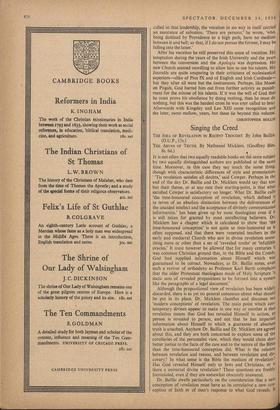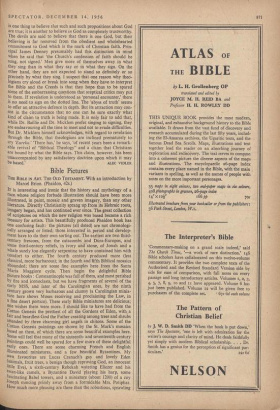Singing the Creed
THE IDEA OF REVELATION IN RECENT THOUGHT. By John Baillie. (O.U.P., 15s.)
THE ABYSS OF TRUTH. By Nathaniel Micklem. (Geoffrey files, 8s. 6d.) •
IT is not often that two equally readable books on th6 same subject by two equally distinguished authors are published at the same time. Moreover, in this case they say much the same thing, though with characteristic differences of style and presentation. 'Tis revelation satisfies all doubts,' said Cowper. Perhaps in the end of the day Dr. Baillie and Dr. Micklem would say that too, but their theme, or at any rate their starting-point, is that what satisfied Cowper is satisfactory no longer. What Dr. Baillie calls 'the time-honoured conception of revelation, which defined it in terms of an absolute distinction between the deliverances of the unaided intellect and the acceptance of divinely communicated information,' has been given up by most theologians even if it is still taken for granted by most unreflecting believers. Dr, Micklem has • a chapter which is calculated to show that 'the time-honoured conception' is not quite so time-honoured as is often supposed, and that there were venerated teachers in the early and mediaeval Church who saw in divine revelation some' thing more or other than a set of 'revealed truths' or 'infallible oracles.' It must however be allowed that for many centuries it was common Christian ground that, in the Bible and the Creeds, God had supplied information about Himself which was guaranteed to be correct. Nowadays, as Dr. Baillie notes, even such a reviver of orthodoxy as Professor Karl Barth complains that the older Protestant theologians made of Holy Scripture ‘3 static sum of revealed propositions to be formed into a system like the paragraphs of a legal document.'
Although the propositional view of revelation has been widelY discarded, there is as yet no general consensus about what should be put in its place. Dr. Micklem classifies and discusses ten 'modern conceptions' of revelation. The main point which con- temporary divines appear to make in one way or another is that revelation means that God has revealed Himself in action, as person is revealed to person, and not that he has imparted information about Himself to which a guarantee of absolute truth is attached. Anyhow Dr. Baillie and Dr. Micklem are agreed about this, and they are both concerned to explore some of the corollaries of the personalist view, which they would claim does better justice to the facts of the case and to the nature of the Bible than the time-honoured conception did. What is the relation between revelation and reason, and between revelation and 0' covery? In what sense is the Bible the medium of revelation? Has God revealed Himself only to Jews and Christians, or is there a universal divine revelation? These questions are freshly formulated, even if they are somewhat obscurely answered.
Dr. Baillie dwells particularly on the consideration that a nevi conception of revelation must have as its correlative a new con' ceptiou of faith or of man's response to what God reveals. It
is one thing to believe that such and such propositions about God are true; it is another to believe in God as completely trustworthy. The devils are said to believe that there is one God, but their believing is far removed from the obedient and wholehearted commitment to God which is the mark of Christian faith. Prin- cipal James Denney presumably had this distinction in mind when he said that 'the Church's confession of faith should be sung, not signed.' Men give more of themselves away in what they sing than in what they say or in what they sign. On the other hand, they are not expected to stand so definitely or so precisely by what they sing. I suspect that one reason why theo- logians cry aloud or break into song when they have to interpret the Bible and the Creeds is that they hope thus to be spared some of the embarrassing questions that sceptical critics may put to them. If revelation is understood as 'personal encounter,' there is no need to sign on the dotted line. The 'abyss of truth' seems to offer an attractive defence in depth. But its attraction may con- sist in the circumstance that no one can be sure exactly what kind of claim to truth is being made. It is only fair to add that, While Dr. Baillie and Dr. Micklem prefer singing to signing, they are endeavouring all the time to meet and not to evade difficulties. But Dr. Micklem himself acknowledges, with regard to revelation through the Bible, that theologians are inclined prematurely to cry 'Eureka.' There has,' he says, 'of recent years been a remark- able revival of "Biblical Theology" and a claim that Christians are bound by what the Bible says. This claim, however, has been unaccompanied by any satisfactory doctrine upon which it may











































 Previous page
Previous page